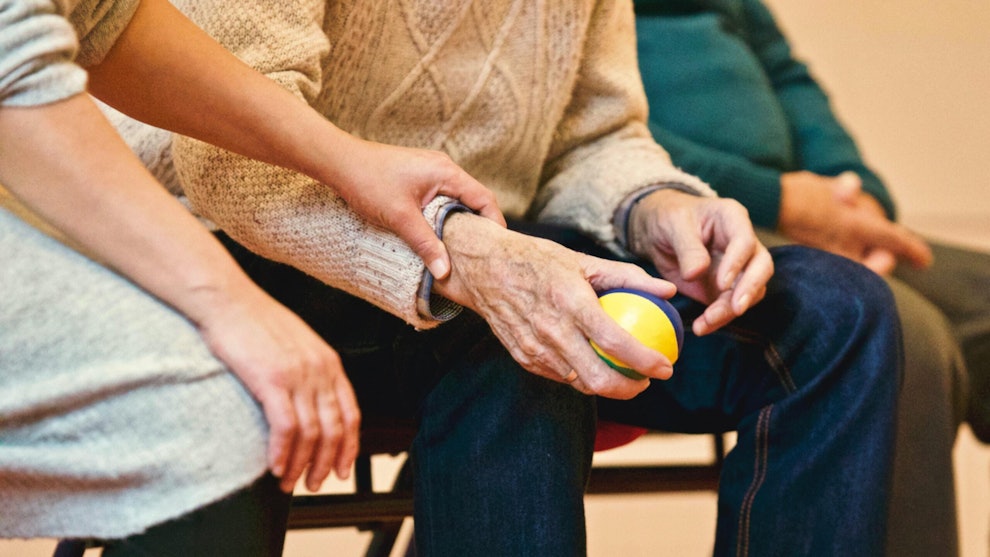Help For Alzheimer’s Caregivers: Tips And Resources For Family Members
Article at a glance
Alzheimer’s and related dementias require specific and dedicated caregiving. Dementia progresses and grows worse over time, meaning the patient’s needs will change over time as well.
For those who take on a caregiving role for patients with these conditions, their own needs and well-being often take the backseat.
Most patients with dementia will be under the care of family and friends. Dementia caregivers often report high levels of stress and personal neglect as a result of their role.
There are many different support groups and other resources available for family caregivers.

Caregivers providing support to a person living with Alzheimer’s disease face a unique set of challenges. As the disease progresses, the patient with Alzheimer’s needs will change, and thus the level of care will need adjusting as well. A caregiver will have to constantly educate themselves and stay on top of the patient’s personal care.
Understandably, this can cause a fair amount of stress. In fact, Alzheimer’s caregivers often report high levels of stress and tend to struggle with their mental health leading to struggles with depression and anxiety.
Getting help for Alzheimer’s caregivers is important for their own well-being. This article will explain the basics of Alzheimer’s caregiving, the challenges caregivers face in their caregiving journey, as well as give tips and resources.
What is Alzheimer’s Disease?
Alzheimer’s disease is a progressive brain disorder that greatly impacts one’s daily life by slowly causing memory problems and cognitive decline.
Alzheimer’s disease is a type of dementia. Dementia is an umbrella term for medical conditions marked by issues with memory loss, cognition, and socializing that affect daily living. Alzheimer’s is the most common form of dementia, accounting for 60 to 80 percent of dementia cases.
What Are The Stages of Alzheimer’s Disease?
Because Alzheimer’s is a progressive disease, symptoms worsen over time. Alzheimer’s occurs in three main stages:
Early-Stage
The earliest stages of Alzheimer’s or related dementia are known as the mildest and are normally defined by patients experiencing increased forgetfulness.
Middle-Stage
The middle stages of Alzheimer’s are when the disease worsens and is defined as “moderate” with symptoms such as further problems with memory, cognition, and socializing.
Late-Stage
The latest or last stages of Alzheimer’s are the most grueling and severe. Most patients require complete assistance to perform daily tasks in this phase. Eventually, they will stop responding to their environment altogether.
Note: Each of these Alzheimer’s stages can be broken down further into seven stages. Each stage of Alzheimer’s disease will require different levels of care. As the disease progresses, increased care will most likely be necessary. Learn more about each stage at this resource.

Types of Caregivers
Caregiving can be provided within in-home settings as well as at a skilled nursing facility. In-home caregiving can be performed by visiting nurses as well as family members (or both). Typically, friends and family will be the caregivers.
If a family member or friend is providing care to a person with Alzheimer’s, it will usually mean that the patient will receive in-home care.

Caregiving Skills
Alzheimer’s care requires a number of different skills to ensure patients are tended to holistically. Some of these include:
Practical support
Medical care
Emotional support
Everyday care
Communication skills
Problems Caregivers Face
Alzheimer’s caregivers face many challenges as it is an enormous responsibility. They often experience:
Stress
Burnout
Depression
Anxiety
Tips for Staying Healthy as a Caregiver
A caregiver’s own health matters which is why it’s important for them to relieve their stress and pay attention to how they’re feeling. Some routine activities like regular exercise, practicing stress relief, participating in a support group, and more can help caregiver maintain their holistic health.
Reduce Stress
Relieve stress through strategies such as daily exercise, listening to music, talking to loved ones, etc. Learn more about stress relief at this resource.
Consider Respite Care
Respite care is a type of caregiving that gives the main caregiver leave. Respite services may include visiting nurses for a few hours or longer.
Stay Active
Exercise is a great way to stay healthy, both mentally and physically.
Attend an Alzheimer’s Disease Support Group
Support groups can help provide emotional support and understanding for family and other caregivers providing care for a person with Alzheimer’s. There are many Alzheimer’s or dementia caregiver support groups available.
There are support groups available in person and over the phone. Visit the Alzheimer’s Association website to learn more about support groups for caregiving.

Resources for Caregivers
There are a number of resources available for caregivers, including federal government agencies, local resources, and more. Below are some organizations that can provide help for Alzheimer’s caregivers.
Alzheimer’s Association
The Alzheimer’s Association offers various resources, advice, and services for caregivers, including different tips for the different stages of the disease such as the early stages and middle stages.
Note: Visit the Alzheimer’s Association website here.
Alzheimer’s Foundation
The Alzheimer’s Foundation provides countless resources for caregiving including support group information, hotlines, fact sheets, and more.
Note: Visit the Alzheimer’s Foundation website here.
Eldercare Locator
Eldercare Locator is a public service of the U.S. Administration on Aging that provides services for older adults and family members including transportation, housing, health, and other support services.
Note: Visit the Eldercare Locator website here.
National Institute On Aging
The National Institute On Aging provides numerous resources for those
stepping into dementia caregiving including safety tips, caregiver health, advice for legal and financial issues, and more.
Note: Visit the National Institute On Aging’s Alzheimer’s caregiving section of their website.
Family Caregiver Alliance
The Family Caregiver Alliance is an organization for family caregivers specifically. They provide resources such as dementia care tips, community resources, health information, and more.
Note: Visit the Family Caregiver Alliance website to learn more.
When to Transfer to a Skilled Nursing Facility or Hospice Care
Again, while many Alzheimer’s patients are under the care of family members and friends, there may come a time when more skilled care or hospice services may be needed. Moving to a skilled care facility can be a difficult call to make and there is no one-size-fits-all solution as Alzheimer’s is a complex disease and everyone moves through it differently.
Before any transition is made, it is important to discuss all of the options available with a healthcare provider or other professionals to help make the most informed decision possible.
FAQ
What are the three signs of caregiver stress?
A few signs of caregiver stress may include feeling burdened or worried constantly, feeling overwhelmed or sad, and experiencing high levels of stress and irritation.
What are two common issues that affect family caregivers of someone with dementia?
While caregivers may have varying challenges, family caregivers often experience a higher risk of anxiety or depression compared to other conditions that require caregiving.
Sources
https://www.nia.nih.gov/health/getting-help-alzheimers-caregiving
https://www.alz.org/help-support/caregiving/stages-behaviors/early-stage
https://www.alz.org/help-support/caregiving/stages-behaviors/middle-stage
https://www.alz.org/help-support/caregiving/stages-behaviors/late-stage
https://www.alz.org/help-support/caregiving/caregiver-health/caregiver-stress
https://www.alz.org/help-support/caregiving/care-options/hospice-care
Become a patient
Experience the Oak Street Health difference, and see what it’s like to be treated by a care team who are experts at caring for older adults.




